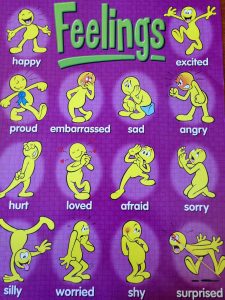Emotions are feelings that represent an instinctive state of mind deriving from one’s circumstances or relationships with others. Stress, or pain, is a signal that something is wrong, and it comes in many unpleasant but helpful flavors. Pleasure is a signal that something is right, and it also comes in many flavors. These flavors are all the various emotions we human beings experience. They help us make choices and give us a vital compass that tells us where to go and who to spend time with.
 Emotions aren’t always obvious, and sometimes we can feel two or three at the same time. So whenever anything big happens in your life, it’s good to ask yourself, “How am I feeling about this?”
Emotions aren’t always obvious, and sometimes we can feel two or three at the same time. So whenever anything big happens in your life, it’s good to ask yourself, “How am I feeling about this?”
The answer will usually include one of the basic emotions like happiness, sadness, love, anger, excitement, or fear–though some experts include guilt, disgust, and even boredom among the basics. Many familiar feelings, like the ones in this picture, can be made up of these components.
To be more precise, think of an emotion as 1) a spontaneous reaction consisting of a feeling, 2) a facial expression, 3) an impulse, and 4) a bodily sensation. For instance, anger can come with 1) the conscious feeling of being angry, 2) a scowl and a furrowed brow, 3) the impulse to yell at or hit someone, and 4) the feeling of your muscles tensing up.
Emotions may be subtle or overwhelming, momentary or long lasting, light-hearted or deeply felt, and can contradict other things you are feeling. So learning how to read your signals and tune in to your deepest feelings can be essential. Psychotherapy can help with this process so that you can sense what is not working for you and how it might be fixed and who or what is right for you and in what way.
With your emotions as your guide, you’ll walk through life with a better sense of purpose and direction.
–Dr. Adam
